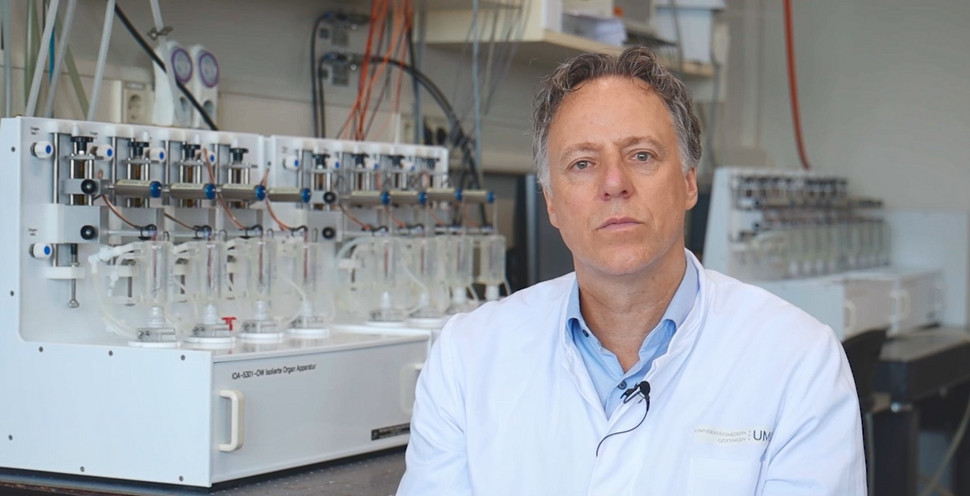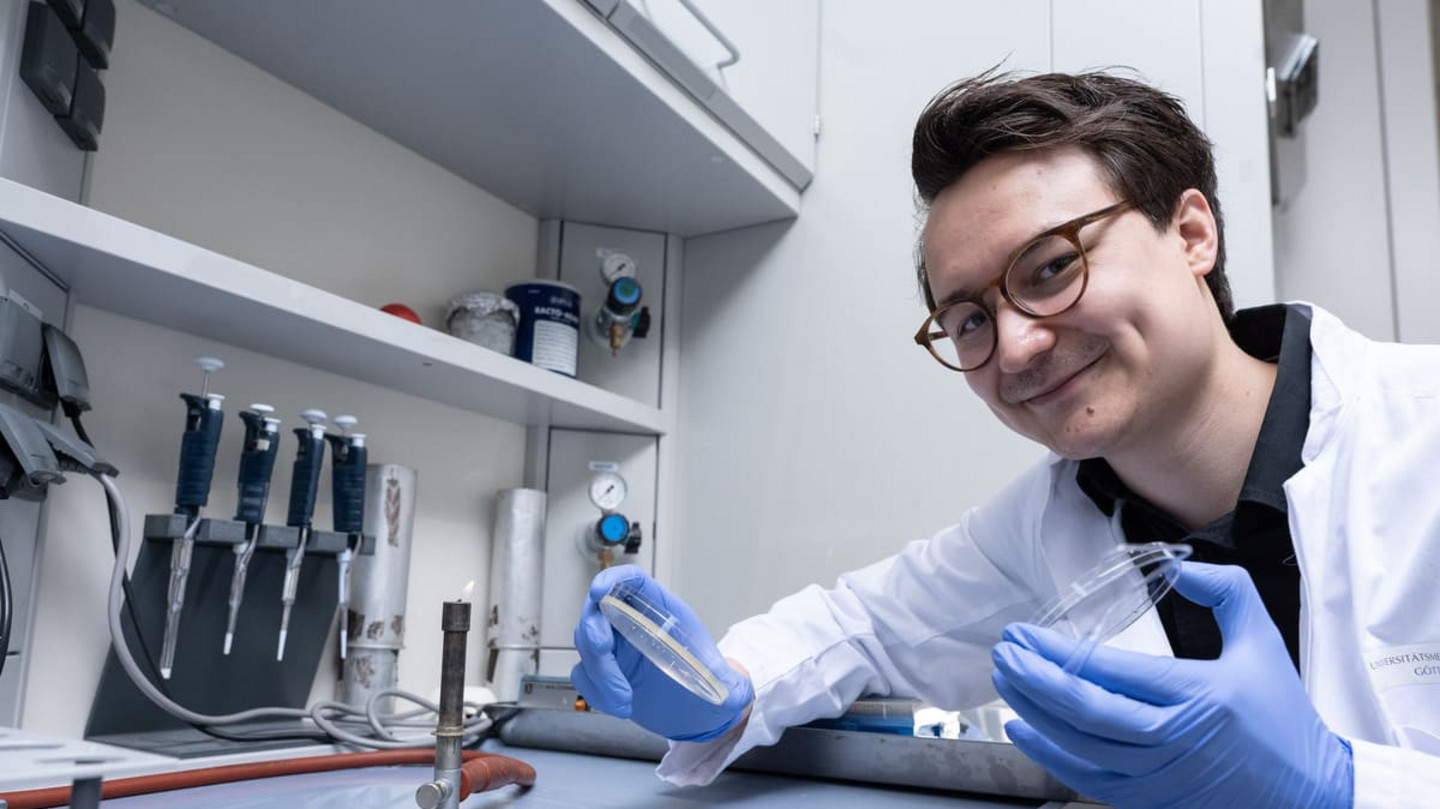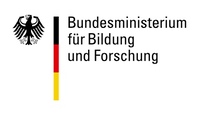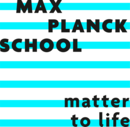Vom Direktor
Wir verwenden systemorientierte Ansätze, um die komplexen zellulären Prozesse zu entschlüsseln, die der Entwicklung der Herzinsuffizienz zugrunde liegen, mit dem Ziel, neue therapeutische Strategien zu definieren. Die Erkenntnisse aus der Entwicklungsbiologie und den Alterungsprozessen werden genutzt, um neue Wirkstoffziele in Kardiomyozyten, Nicht-Myozyten und dem extrazellulären Stroma zu identifizieren, die das Herz schützen und regenerieren können. Eine zentrale Herausforderung besteht darin, primäre und sekundäre Prozesse in der Pathologie der Herzinsuffizienz zu definieren, um optimale therapeutische Strategien zu entwickeln.
Die Mehrzahl der Patienten mit Herzinsuffizienz weist schwere strukturelle und funktionelle Beeinträchtigungen des Herzens auf, die nur begrenzt auf eine klassische pharmakologische Behandlung ansprechen. Diese Patienten können von einer Rekonstruktion des funktionellen Herzmuskels durch stammzellbasierte Gewebezüchtung profitieren. Die Abteilung für Pharmakologie und Toxikologie setzt modernste Konzepte aus der Pharmakologie und der biomedizinischen Technik ein, um einen Konzeptnachweis zu erbringen und eine individualisierte gewebetechnische Herzreparatur umzusetzen.
Das Tissue Engineering ermöglicht es uns, dreidimensionale Kultursysteme mit organotypischer Struktur und Funktion zu bauen. In der Abteilung für Pharmakologie und Toxikologie werden zusätzlich verschiedene Organsurrogate entwickelt, um Krankheitsprozesse zu simulieren und neue Therapeutika zum Schutz und zur Regeneration von Organen zu entwickeln. Die Verfügbarkeit von Stammzellen einzelner Patienten bietet die Möglichkeit, neue pharmakologische, genbasierte und zellbasierte Ansätze für individualisierte Behandlungen von Patienten mit Herzinsuffizienz, Skelettmuskelerkrankungen und neurologischen Störungen zu entwickeln.
Neben unseren Aktivitäten in der Forschung und der Ausbildung von Studierenden der Medizin und der Naturwissenschaften bieten wir professionelle Beratungsleistungen im Bereich der Arzneimitteltherapie an.
Prof. Dr. med. Wolfram-Hubertus Zimmermann
Aktuelle Publikationen
- Tiper Y, Xie Z, Hofemeier AD, Lad H, Luber M, Krawetz R, Betz T, Zimmermann WH, Morton AB, Segal SS, Gilbert PM. Optimizing Electrical Field Stimulation Parameters Reveals the Maximum Contractile Function of Human Skeletal Muscle Microtissues. Am J Physiol Cell Physiol. 2025 Feb 28. doi: 10.1152/ajpcell.00308.2024. Epub ahead of print. PMID: 40019026.
- Jebran AF, Seidler T, Tiburcy M, Daskalaki M, Kutschka I, Fujita B, Ensminger S, Bremmer F, Moussavi A, Yang H, Qin X, Mißbach S, Drummer C, Baraki H, Boretius S, Hasenauer C, Nette T, Kowallick J, Ritter CO, Lotz J, Didié M, Mietsch M, Meyer T, Kensah G, Krüger D, Sakib MS, Kaurani L, Fischer A, Dressel R, Rodriguez-Polo I, Stauske M, Diecke S, Maetz-Rensing K, Gruber-Dujardin E, Bleyer M, Petersen B, Roos C, Zhang L, Walter L, Kaulfuß S, Yigit G, Wollnik B, Levent E, Roshani B, Stahl-Henning C, Ströbel P, Legler T, Riggert J, Hellenkamp K, Voigt JU, Hasenfuß G, Hinkel R, Wu JC, Behr R, Zimmermann WH. Engineered heart muscle allografts for heart repair in primates and humans. Nature. 2025 Jan 29. doi: 10.1038/s41586-024-08463-0. Epub ahead of print. PMID: 39880949.
- Tah I, Haertter D, Crawford JM, Kiehart DP, Schmidt CF, Liu AJ. A minimal vertex model explains how the amnioserosa avoids fluidization during Drosophila dorsal closure. Proc Natl Acad Sci U S A. 2025 Jan 7;122(1):e2322732121. doi: 10.1073/pnas.2322732121. Epub 2024 Dec 30. PMID: 39793057; PMCID: PMC11725931.
- Yuan Q, Verbueken D, Dinani R, Kim R, Schoger E, Morsink CD, Simkooei SA, Kemna LJM, Hjortnaes J, Kuster DWD, Boon RA, Zelarayan LC, van der Velden J, Buikema JW. Glycogen synthase kinase-3 inhibition and insulin enhance proliferation and inhibit maturation of human iPSC-derived cardiomyocytes via TCF and FOXO signaling. Stem Cell Reports. 2024 Dec 5:102371. doi: 10.1016/j.stemcr.2024.11.001. Epub ahead of print. PMID: 39642876.
- Shumanska M, Lodygin D, Gibhardt CS, Ickes C, Stejerean-Todoran I, Krause LCM, Pahl K, Jacobs LJHC, Paluschkiwitz A, Liu S, Boshnakovska A, Voigt N, Legler TJ, Haubrock M, Mitkovski M, Poschmann G, Rehling P, Dennerlein S, Riemer J, Flügel A, Bogeski I. Mitochondrial calcium uniporter complex controls T-cell-mediated immune responses. EMBO Rep. 2024 Dec 2. doi: 10.1038/s44319-024-00313-4 . Epub ahead of print. PMID: 39623165.
- Derks W, Rode J, Collin S, Rost F, Heinke P, Hariharan A, Pickel L, Simonova I, Lázár E, Graham E, Jashari R, Andrä M, Jeppsson A, Salehpour M, Alkass K, Druid H, Kyriakopoulos CP, Taleb I, Shankar TS, Selzman CH, Sadek H, Jovinge S, Brusch L, Frisén J, Drakos S, Bergmann O. A Latent Cardiomyocyte Regeneration Potential in Human Heart Disease. Circulation. 2024 Nov 21. doi: 10.1161/CIRCULATIONAHA.123.067156. Epub ahead of print. PMID: 39569515.
„Herzpflaster“ aus Stammzellen zur Reparatur des Herzmuskels bei Herzversagen
Video auf Deutsch
In der BioVAT-HF-DZHK20-Studie wird der Einsatz von Herzmuskelgewebe aus Stammzellen bei Patienten mit schwerer Herzinsuffizienz untersucht. Durch die Einbringung von im Labor gezüchtetem Herzmuskelgewebe soll die Pumpfunktion von erkrankten Herzen langfristig verbessert werden. In der multizentrischen klinischen Studie werden Patienten mit schwerer Herzinsuffizienz in Göttingen (UMG) und Lübeck (UKSH) behandelt. Der Abschluss des Dosisfindungsteils von BioVAT-HF zeigt, dass die EHM in allen getesteten Dosen gut verträglich sind.

![[Translate to Deutsch:] Prof. Wolfram-Hubertus Zimmermann, Director of the Department of Pharmacology and Toxicology](/fileadmin/_processed_/d/f/csm_Header_Zimmermann_skaliert_1bee926047.jpg)

![[Translate to Deutsch:] Pharmacology professors in conversation](/fileadmin/_processed_/c/9/csm_Diskussion_27f5031170.jpg)
![[Translate to Deutsch:] Researcher at the microscope](/fileadmin/_processed_/9/e/csm_Zelarayan_Confocal_Microscope_52acfc62a3.jpg)







![[Translate to Deutsch:] RTG 2824 "Heart & Brain diseases: integrative research across organs"](/fileadmin/_processed_/0/e/csm_csm_Logo_f%C3%BCr_B%C3%BChne_61336f3009.jpg)









